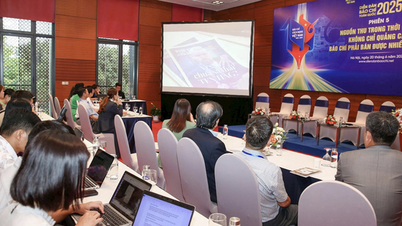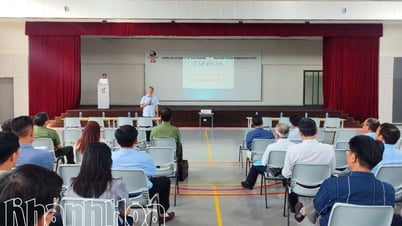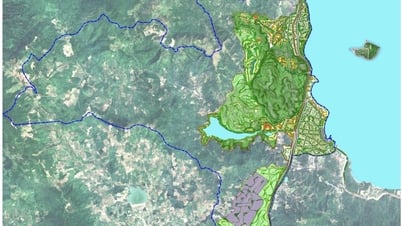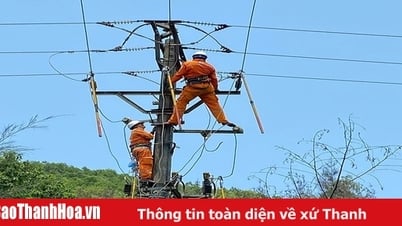Business households hope that when the tax contract ends, the new tax policy will be simple and easy to apply because business households are not bound by procedures and are very afraid of being fined - Photo: Quang Dinh
However, according to experts, there should be special incentive mechanisms, especially regarding taxes, to encourage business households to become enterprises.
Data from the tax authority shows that the country has about 5 million households and individuals doing business, but only 3.6 million households are registered to pay taxes.
Of these, only nearly 2 million households are applying the lump-sum tax method with an average tax rate of about 700,000 VND/month/household. According to Resolution 68 on private economic development of the Politburo , lump-sum tax for business households will be abolished by 2026 at the latest.
Create a transparent business environment
Ms. Nguyen Thi Cuc - President of the Tax Consulting Association - said that the whole country has about 5 million households and individuals doing business, with 3.6 million households registered to pay taxes. Of these, nearly 2 million households are applying the lump-sum tax method, with the average lump-sum tax rate in the first quarter of 2025 being only about 700,000 VND/month/household.
"Notably, there are still many drug stores, private clinics, spas... with quite large revenues, even an individual service business can earn hundreds of millions of VND per day but only pay a few million VND in taxes. This shows that the determination of taxable revenue still does not reflect reality, leading to unfairness and loss of state budget revenue," said Ms. Cuc.
Therefore, according to Mr. Nguyen Ngoc Tu - a tax expert, switching to tax declaration will contribute to creating a transparent and healthy business environment, ensuring fairness for serious and decent business households, contributing to limiting the situation of counterfeit goods, fraudulent business, and tax evasion.
Meanwhile, Ms. Ngan (District 3, Ho Chi Minh City) said that her family sells local specialties, both online and at home, with a lump-sum tax of more than 1 million VND/month, without having to worry about inspections, checks, invoices, or tax penalties. Therefore, when hearing the news that lump-sum tax would be abolished for business households, Ms. Ngan was quite worried.
"On a small scale, I cannot maintain an accounting system if I become a business. If I invest in machines to issue electronic invoices generated from cash registers connected to electronic data transfer with tax authorities, the cost is also quite high," said Ms. Ngan.
Similarly, Ms. Van, the owner of a beef noodle shop in Go Vap, said that because her business is small, she has not thought about becoming an enterprise. "After hearing that the lump-sum tax for business households will be abolished, I don't know if I will have to become an enterprise or switch to a household declaration form like business households with revenue of 1 billion VND or more?", Ms. Van worried.
According to Ms. Van, if lump-sum tax is abolished, there should be a suitable tax policy for business households, especially not imposing too heavy fines on invoices. Many business households that pay lump-sum tax said that they only operate on a family scale, taking labor as profit, so they are also worried that the new tax calculation method will increase and affect profits...
Strong support will encourage household businesses to become enterprises.
Speaking to Tuoi Tre, Associate Professor Dr. Nguyen Thuong Lang, National Economics University, said that applying the declaration tax and eliminating the lump-sum tax will encourage business households to grow and become enterprises. The goal of having 2 million enterprises nationwide by 2030, as set by the Politburo in Resolution 68, which is an increase of more than 1 million enterprises compared to the present, is achievable.
"With 5 million business households, if only 20% of households convert to enterprises, we will have 1 million enterprises. However, to encourage business households to become enterprises, there needs to be special incentives, especially regarding taxes," Mr. Lang said, proposing tax exemption for the first 4 years and reduction for the next 5 years from the time the business makes a profit for enterprises converting from households, and free procedures for becoming enterprises.
In addition, according to Mr. Lang, the design of accounting and tax regulations must be simple, easy to implement, and suitable for the business model of these micro-enterprises. Accordingly, only 3 indicators including total revenue, total costs, and profits need to be declared fully and clearly. The tax authority will conduct post-audit.
Ms. Cuc also believes that it is necessary to build simple, easy-to-use declaration support software, suitable for those who are not specialized in accounting or technology. Households can easily enter revenue, expenses, purchased and sold goods without too much difficulty. Because the transition from lump-sum tax to declaration causes many small businesses to face many challenges.
"The State can provide a transition period of 6 months to 1 year for businesses to get used to the new method. And during that time, the State should provide software and support tools for free. This not only helps them access easily, but also creates a positive, proactive mindset for conversion," Ms. Cuc recommended.
Tax expert Nguyen Ngoc Tu said that in Resolution 68 on private economic development, the Politburo directed to have special mechanisms and policies to support small and medium enterprises, abolish business license fees, and exempt corporate income tax for small and medium enterprises in the first 3 years of establishment. This is very necessary for the private economic sector, and it is necessary to specify these directions for implementation as soon as possible.
"Accordingly, the corporate income tax rate for small and micro enterprises is 3-5% lower than the general tax rate, creating conditions for small and micro enterprises to accumulate capital to develop production and business and expand their scale of operations. Only then will micro enterprises have the opportunity to develop into small enterprises, and small enterprises develop into medium-sized enterprises...", Mr. Tu said.
Need guidance on declaring input costs
Many business households want specific guidance from tax authorities on declaring input costs - Photo: Quang Dinh
From June 1, according to Decree 70, business households and individuals who are applying lump-sum tax, or business households that sell directly, retail in the fields of trade, auto repair services, transportation... with revenue of 1 billion VND or more must connect and use electronic invoices through cash registers connected to tax authorities.
"This is the basis for determining revenue in a transparent manner, thereby preventing tax losses," said tax expert Nguyen Ngoc Tu, adding that it is impossible for stores selling medicine, functional foods, milk, etc. to not apply electronic invoices that connect cash registers to tax authorities.
However, according to Mr. NVH - owner of a restaurant chain in Cau Giay district, Hanoi, the concern is that input costs such as herbs, some spices... purchased at the market, directly from growers, do not have input invoices. Therefore, Mr. H. hopes to be guided to declare these costs to be deducted before calculating taxes.
"Applying electronic invoices connects cash registers with the tax authority's system, the revenue is very clear. In cases where the procedures and regulations on accounting, tax, insurance... are simple, suitable for micro-enterprises with revenue of 1-3 billion VND/year, we are ready to become enterprises," said Mr. NVH.
Must declare according to actual revenue
According to Ms. Nguyen Thi Cuc, when switching to the declaration form, business activities must issue invoices, have sales documents and declare taxes periodically. In addition, business households also need to clearly distinguish between the two tax calculation methods.
Specifically, households and individuals doing business with revenue of 1 billion VND or more will apply the deduction method to calculate value added tax (VAT). Then, VAT will be calculated by taking output tax minus input tax and paying the remaining difference.
Business households with revenue under 1 billion VND still have to pay tax, but the tax calculation method will be applied based on the percentage of revenue generated during the period, not the fixed one-year form as before.
For example, according to current regulations, commercial activities and sales of goods are subject to 1% VAT and 0.5% personal income tax. House rentals may be subject to a tax rate of 10% (including VAT and personal income tax)...
Thus, if during the year, a business household generates revenue of 500 million VND, it will declare and pay tax based on this exact amount, no longer "a lump sum" as before, but must declare according to actual revenue each month and each quarter.
Prof. Dr. Hoang Van Cuong (member of the National Assembly's Finance and Budget Committee):
Business households "refuse to grow" for fear of compliance burden
One of the important reasons why business households and small and medium enterprises "refuse to grow" is the cost of tax compliance. In theory, tax policy is applied uniformly to all businesses. But in reality, the cost of compliance is inversely proportional to the size. The smaller the business, the greater the burden, if calculated as a percentage of revenue or profit.
A large enterprise can hire an entire accounting department to do tax. But a small enterprise with a revenue of several hundred million VND must also hire a tax preparer - that cost accounts for a huge proportion of total revenue. This imbalance is one of the invisible walls that prevents individual businesses from becoming enterprises.
In reality, many businesses do not mind paying taxes but are afraid of cumbersome procedures, additional costs and the risk of administrative penalties.
If the tax system is not simplified, this “gray area” will continue to exist – not because of evasion of obligations, but because of the fear of not being able to comply with the law. In that case, we will lose the opportunity to turn informal resources into legal, transparent and sustainable productive forces.
When compliance costs are low, businesses will have no incentive to avoid them. On the contrary, they will proactively participate in the system to be protected and develop. I propose that the financial sector needs to have a breakthrough mindset, dare to innovate, dare to take responsibility, dare to overcome its own limits, resolutely eliminate the mechanism of asking and giving, cumbersome administrative procedures, reduce inconvenience and harassment for people and businesses.
Back to topic
LE THANH - ANH HONG
Source: https://tuoitre.vn/co-che-thue-don-gian-ho-kinh-doanh-se-len-doanh-nghiep-20250518075303369.htm







![[Photo] Panorama of the Opening Ceremony of the National Press Festival 2025](https://vphoto.vietnam.vn/thumb/1200x675/vietnam/resource/IMAGE/2025/6/20/6b835ee92c2c4df587af73cb2d1f4f5f)





















![[Photo] General Secretary To Lam chairs the 14th Central Military Commission Conference](https://vphoto.vietnam.vn/thumb/1200x675/vietnam/resource/IMAGE/2025/6/20/a9d25fc6dd664fb9a3757502f32e5db0)
























![[Maritime News] Wan Hai Lines invests $150 million to buy 48,000 containers](https://vphoto.vietnam.vn/thumb/402x226/vietnam/resource/IMAGE/2025/6/20/c945a62aff624b4bb5c25e67e9bcc1cb)















































Comment (0)